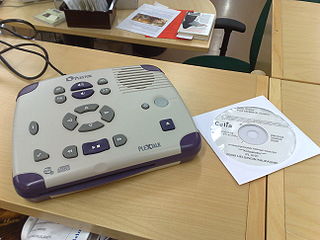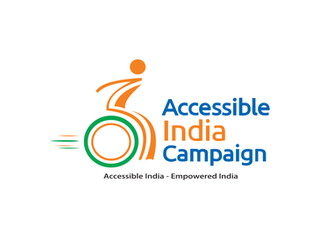
Accessibility is the design of products, devices, services, vehicles, or environments so as to be usable by people with disabilities. The concept of accessible design and practice of accessible development ensures both "direct access" and "indirect access" meaning compatibility with a person's assistive technology.
Service and supports for people with disabilities are those government or other institutional services and supports specifically provided to enable people who have disabilities to participate in society and community life. Some such services and supports are mandated or required by law, some are assisted by technologies that have made it easier to provide the service or support while others are commercially available not only to persons with disabilities, but to everyone who might make use of them.

The CNIB Foundation is a Canadian charitable organization and volunteer agency dedicated to assisting Canadians who are blind or living with vision loss, and to provide information about vision health for all Canadians. Founded in 1918 as the Canadian National Institute for the Blind to assist soldiers who had been blinded in the First World War, CNIB originally offered sheltered care and specialized employment to people with vision loss. It has since expanded to include other programs and services, including research, public education, rehabilitation counselling and training, advocacy and an alternative-format library for people living with a print disability. It is a member of the Braille Authority of North America.
The International Federation of Library Associations and Institutions (IFLA) is an international body representing the interests of people who rely on libraries and information professionals. A non-governmental, not-for-profit organization, IFLA was founded in Scotland in 1927 with headquarters at the National Library of the Netherlands in The Hague. IFLA sponsors the annual IFLA World Library and Information Congress, promoting access to information, ideas, and works of imagination for social, educational, cultural, democratic, and economic empowerment. IFLA also produces several publications, including IFLA Journal.

Digital accessible information system (DAISY) is a technical standard for digital audiobooks, periodicals, and computerized text. DAISY is designed to be a complete audio substitute for print material and is specifically designed for use by people with "print disabilities", including blindness, impaired vision, and dyslexia. Based on the MP3 and XML formats, the DAISY format has advanced features in addition to those of a traditional audio book. Users can search, place bookmarks, precisely navigate line by line, and regulate the speaking speed without distortion. DAISY also provides aurally accessible tables, references, and additional information. As a result, DAISY allows visually impaired listeners to navigate something as complex as an encyclopedia or textbook, otherwise impossible using conventional audio recordings.
The National Library Service for the Blind and Print Disabled (NLS) is a free library program of braille and audio materials such as books and magazines circulated to eligible borrowers in the United States and American citizens living abroad by postage-free mail and online download. The program is sponsored by the Library of Congress. People may be eligible if they are blind, have a visual disability that prevents them from reading normal print, or a physical disability that keeps them from holding a book. Library materials are distributed to regional and subregional libraries and then circulated to eligible patrons. In total there are 55 regional libraries, 32 subregional libraries, and 14 advisory and outreach centers serving the United States and its territories: the District of Columbia, Puerto Rico, the U.S. Virgin Islands, and Guam.

Accessible publishing is an approach to publishing and book design whereby books and other texts are made available in alternative formats designed to aid or replace the reading process. It is particularly relevant for people who are blind, visually impaired or otherwise print-disabled.
The Norwegian Library of Talking Books and Braille is a public library organization based in Oslo, Norway. It produces and loans out audiobooks and braille books. Its services are aimed at people who have difficulty reading printed texts, for example because of dyslexia, visual impairment or other disabilities which making reading difficult. The library serves users across the whole country and the service is free of charge. Audiobooks are sent free by post on CD and can also be downloaded or streamed from the library's website. Users can also use the library's Lydhør app to listen to audiobooks on smartphones or tablets. The library is Norway's largest producers of audiobooks and braille books. In 2014, its collection was made up of 18,000 audiobooks and 7400 braille books. The library also produces and loans out study materials for students with difficulties reading printed texts. Norwegian law permits the library to produce audio books and braille books from material subject to copyright. The library has about 29,000 users.
Mitra Jyothi established in 1990, is a charitable trust registered under Indian Trust Act based in Bangalore. Its aims to support the visually impaired through various programs it offers. These programs include Talking Book Library, Computer Training Center, Independent Living Skills, Braille Transcription Center and Job Placement. It received State Award in 2010 from the Directorate of Disabled Welfare and Senior Citizens, Government of Karnataka for its exemplary service for persons with disabilities. Mitra Jyothi is also a member of the DAISY Forum of India (DFI). DFI is a forum of Not for profit organizations from India who are involved in production of books and reading materials in accessible formats for persons who cannot read normal print.

The West German Audio Book Library for the Blind, abbreviated WBH, is a specialist library which produces and distributes audiobooks and periodicals for blind and partially sighted persons. It is the largest library of its kind in the German speaking world. The WBH supplies a nationwide network of libraries for the visually impaired, primarily in the western German states of North Rhine-Westphalia, Rhineland-Palatinate and the Saarland, but also to other states and abroad.

The Marrakesh VIP Treaty is a treaty on copyright adopted in Marrakesh, Morocco, on 27 June 2013. It achieved the deposit of 20 instruments of ratification or accession by eligible parties needed for entry into force on June 30, 2016 and entered into force three months later, on September 30, 2016. As of February 2023, the treaty has 94 contracting parties covering 120 WIPO Member States because the European Union joined as a block.
Chakshumathi is a nongovernmental, not for profit organization based in Thiruvananthapuram, Kerala, India, working for developing resources for the use of visually impaired people. It is an "Empowerment and Assistive Technology Centre for Blind". The organization, which was inaugurated in June 2011, is a member of DAISY Forum of India. The organization is currently headed by V.K. Damodaran, a former President of Kerala Sasthra Sahithya Parishad.
DAISY Forum of India is a not for profit organisation involved in the production of books and other reading materials for persons with print disabilities including blindness. It is a network of more than 80 organisations working in different parts of India for the welfare of visually impaired people. The members of the Forum are categorised into different classes: Primary Members, Associate Members, Development Partners, Friends of the Society, Supporters of the Society and Partners in Governance. All categories of members, except Partners in Governance, have to pay a fixed amount to be eligible to become members. There are different committees like Technology Committee, Awareness Committee, Capacity Building Committee, and Policy and Regulations Intervention Committee to deal with various different activities of the organisation.
A print-disabled person is "a person who cannot effectively read print because of a visual, physical, perceptual, developmental, cognitive, or learning disability". A print disability prevents a person from gaining information from printed material in the standard way, and requires them to utilize alternative methods to access that information. Print disabilities include visual impairments, learning disabilities, or physical disabilities that impede the ability to manipulate a book. The term was coined by George Kerscher, a pioneer in digital talking books. DAISY is used by libraries as a means of making complex books accessible via audio.

Accessible India Campaign or Sugamya Bharat Abhiyan is a program which is set to be launched to serve the differently-able community of the country. The program comes with an index to measure the design of disabled-friendly buildings and human resource policies. The flagship program has been launched by the Prime Minister on 3 December 2015, the International Day of people with Disabilities. The initiative also in line with the Article 9 of the to which India is a signatory since 2007. The scheme also comes under Persons with Disabilities Act, 1995 under section 44, 45, 46 for equal Opportunities and protection of rights which provides non-discrimination in Transport to Persons with Disabilities.

People with disabilities in Pakistan are seen differently than in most Western countries due to cultural and religious beliefs. The lack of accurate epidemiological evidence on disabilities, insufficient resources, weak health care facilities and worker shortages are major obstacles to meeting the needs of disabled Pakistanis.

Nota, or the Danish Library and Expertise Center for people with print disabilities, is a state-run library under the Danish Ministry of Culture that produces audiobooks, e-books and Braille books for people who cannot read ordinary printed text. The organization is headquartered in Nakskov, Denmark.

The Accessible Books Consortium (ABC) is a public-private partnership which was launched in 2014 by the World Intellectual Property Organization. The ABC was created with the intent of being "one possible initiative, amongst others, to implement the aims of the Marrakesh VIP Treaty at a practical level." ABC's goal is "to increase the number of books worldwide in accessible formats - such as braille, audio, e-text, and large print and to make them available to people who are blind, have low vision or are otherwise print disabled."
Kalimat Foundation is a non-profit organization based in Sharjah, United Arab Emirates. Its mission is to provide books and reading materials to children in need and promote a culture of reading among them. The Foundation is the charitable arm of Kalimat Group, a publisher in the United Arab Emirates, with international partnerships including Britain's Bloomsbury and France's Gallimard Jeunesse. The organisation’s founder and chairperson is Bodour Al Qasimi, President of the American University of Sharjah, past President of the International Publishers Association.










